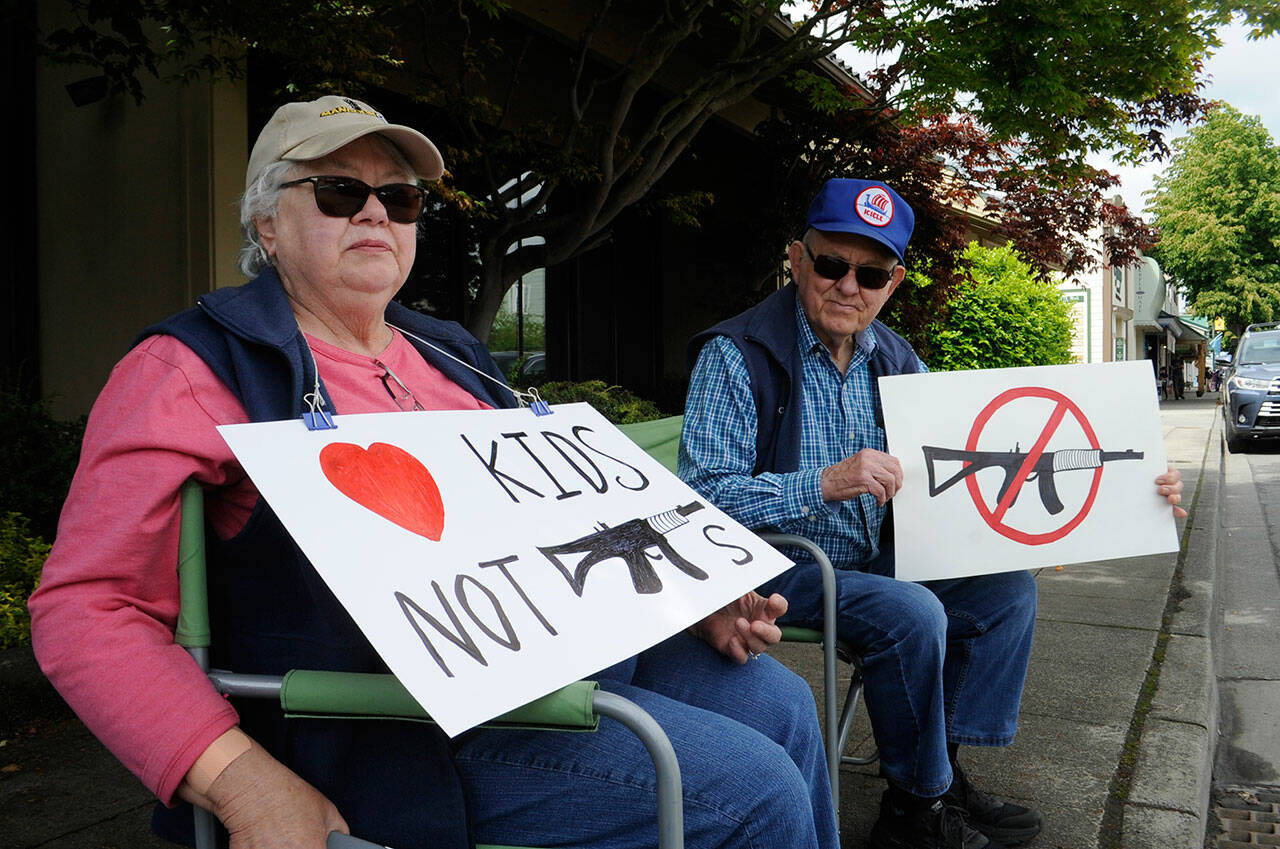People from across the North Olympic Peninsula gathered last Saturday in downtown Sequim to join the nation-wide March for Our Lives rallies.
About 200 people, some of whom traveled from Neah Bay, Port Angeles and Port Townsend, to join Indivisible Sequim and Voices for Health and Healing members in urging a national ban on assault weapons, universal background checks and/or voting for candidates promoting stricter gun control.
The crowd, who held signs and walked from the Washington Street/Sequim Avenue intersection to Fourth and Fifth Avenues and back, discussed a continued sense for action particularly following mass shootings on May 14 in a Buffalo supermarket and May 24 at Robb Elementary in Uvalde, Texas.
Jan and Eldon Dennis of Sequim sat along Washington Street with signs they’ve kept since the 2018 shooting at Marjory Stoneman Douglas High School in Parkland, Fla.
“We’re not anti-gun. We want to let our community know how we feel, especially about assault guns. We would like them banned,” said Jan, a retired nurse from Juneau, Alaska.
“We’re anti-easy accessibility,” said Eldon, a retired chemistry and physics teacher.
Prior to marching, Rev. ClayOla Gitane, rector at St. Luke’s Episcopal Church, and Joe McGimpsey, an elder of the Makah Tribe in Neah Bay, prayed for the families of gun violence and blessed the marches across the nation.
Gitane, who helped organize a candlelight vigil for the student and teacher victims of Uvalde, said since then she’s starting to feel determined and that signs reading “How many more?” resonated with her.
“I always believed change was going to be made and now it feels like it’s this time,” she said.
McGimpsey said he drove to Sequim because he wanted to support “common sense laws to be enacted for the protection of all people.”
“There are victims’ living relatives who have to suffer for the rest of their lives,” he said.
“They won’t get rid of the hurt in a year. It’s a lifetime of learning to live without them.”
Linda Downer of Sequim, with her daughter Vanessa Schubert, attended the march hoping to make a difference.
“I’ve been doing protests since ’65 when two of my cousins got blown away in Vietnam,” Downer said. “Ever since then, I’ve been marching for things I believe in.
“[Now], I feel scared for my 11-year-old granddaughter.”
Pat Gritman of Sequim held a sign that read “Here for my grandkids.”
She marched at an anti-gun violence rally in Connecticut a few weeks ago, she said, “because it’s insane losing so many children and so many people to gun violence.”
Annie Benavidez of Sequim held a sign reading “Common sense gun laws now.”
She said she’s “tired of hearing about dead children just wanting to go to school.”
After the march, several speakers addressed the crowd, including Sequim High junior Ruby Coulson, Sequim High graduate Damon Little, Sequim city councilor Vicki Lowe and others.
Sequim March co-organizer Tim Wheeler read a statement from Clallam County commissioner Mark Ozias who tested positive for COVID-19 the day prior. He asked, “Who is profiting from the proliferation of guns and gun culture?”
Ozias wrote that gun manufacturers made $3 billion in profit since the beginning of the pandemic, and he encouraged locals to “support candidates committed to meaningful reform who are committed to putting people ahead of profit.”
He added, “We need to support and engage the multitude of gun owners who favor responsible regulation.”
Liz Bumgarner, former Clallam County Democrats chairman, told participants, “no one is saying ‘take away all guns.’”
She encouraged participants to fight misinformation, to follow donations from gun manufacturers to politicians, and to vote.
Wheeler said they’ll be hosting more events against gun violence in the future.
On June 12, national news outlets reported a bipartisan group of senators announced a potential deal related to guns. Some potential legislation would include increased federal funding for mental health services and school safety, incentivizing placing “red flag” laws in place for states to take guns from potentially dangerous people, making juvenile records of gun buyers under 21 available during background checks, and more.
Among its restrictions, Washington state requires expanded background checks for gun purchases, pistols and semi-automatic weapons can only be purchased by people 21 and older, and 10-plus capacity magazines are prohibited.


